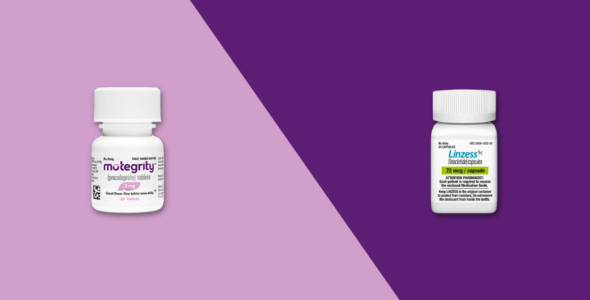Motegrity side effects and how to avoid them
Table of contents
Motegrity is an FDA-approved brand-name medication manufactured by Takeda Pharmaceuticals, originally developed by Shire. It is classified as a serotonin receptor agonist and is used in adults for the treatment of chronic idiopathic constipation (CIC) and for the treatment of irritable bowel syndrome with constipation (IBS-C). While Motegrity is generally well tolerated, there are some potential side effects that people should be aware of. The most common side effects of Motegrity include abdominal pain, bloating, and diarrhea. Less common but more serious side effects can include changes in mood and depression.
Learn more about the side effects of Motegrity and what you can do to avoid them.
What can Motegrity be taken for?
It is a prescription medicine given to adults for the treatment of chronic idiopathic constipation (CIC) and for the treatment of irritable bowel syndrome with constipation (IBS-C). Chronic idiopathic constipation can be treated by making lifestyle changes, like eating more dietary fiber, increasing your water intake, and taking regular physical exercise. But often, this may prove insufficient, particularly with stubborn cases. If you have chronic idiopathic constipation, your doctor may have prescribed Motegrity to you.
The active ingredient in Motegrity is called prucalopride. It’s a type of drug called a serotonin receptor agonist that can speed up how quickly food moves through your digestive system, also known as motility. Muscles in your bowels rhythmically contract (tighten) and relax to move food through your bowels. This process is called peristalsis, and if it happens too slowly, it can cause constipation as the food in your bowels hardens over time. Motegrity can help to stop this from happening. Motegrity stimulates colonic peristalsis and bowel motility by causing acetylcholine release in gastrointestinal neurons.
When you take Motegrity, the active ingredient prucalopride is released into your bowels. It attaches to areas on the outside of the cells in your bowels called 5-HT4 serotonin receptors. This stimulates the receptors, making them produce a natural substance called acetylcholine. The acetylcholine makes your bowel muscle contract faster, speeding up peristalsis and motility.
What are the side effects of Motegrity?
The most common side effects of Motegrity in clinical trials compared to placebo include:
- Headaches
- Fatigue
- Dizziness
- Gastrointestinal disorders – flatulence (gas), bloating, abdominal pain, diarrhea
- Nausea (feeling sick)
- Vomiting (being sick)
More serious side effects of Motegrity include:
- Severe allergic reactions – swelling of your tongue, mouth, or throat, trouble breathing
- Mood problems, including depression and suicidal thoughts and actions
- Ongoing or worsening depression
If you experience any of these serious side effects, stop taking Motegrity and seek medical attention immediately. You are encouraged to report the negative side effects of prescription drugs to the FDA. Visit www.fda.gov/medwatch, or call 1-800-FDA-1088.
What are the long-term side effects of Motegrity?
Long-term side effects of Motegrity include changes in mood or behavior and suicidal thoughts and behavior. Speak to your doctor if you experience these side effects.
Does Motegrity cause hair loss?
Hair loss is not a side effect reported with Motegrity.
Do side effects of Motegrity go away?
Side effects reported in the first week of treatment, such as diarrhea or headaches, normally pass within a couple of days.
Does Motegrity cause weight gain?
Weight gain is not a side effect reported with Motegrity.
Does Motegrity cause loss of appetite?
Motegrity may cause a loss of appetite as a side effect.
What is the proper dosage of Motegrity?
Motegrity is available in 1mg or 2 mg tablets of prucalopride. Take Motegrity with or without food once daily to increase the speed at which food moves through your bowels, helping you have more frequent and regular bowel movements. The recommended adult dose is 2 mg once daily. Patients with severe renal impairment (creatinine clearance (CrCL) less than 30 mL/min) are recommended to take 1 mg once daily.
If you forget to take a dose of Motegrity, take it as soon as you remember, but skip the missed dose if it is nearly time for your next dose. Store Motegrity in its original container at room temperature, away from heat and moisture.
You are advised to read the prescribing information provided with this medicine for the drug information and patient information, and always speak with your healthcare provider for medical advice about any changes to your dose so they can monitor and evaluate your condition.
Does Motegrity need to be taken with food?
Motegrity may be taken once a day, with or without food.
When is the best time of day to take Motegrity?
Motegrity may be taken at any time of the day. It should be taken once a day with or without food.
How long does Motegrity take to work?
Motegrity will take between 1 to 5 days to start working. This will vary from person to person and is only a guideline for when to expect it to work.
Motegrity drug interactions
Motegrity can interact with other medications, including:
- Anticholinergics – atropine, cyclizine, procyclidine
- Antimuscarinics – oxybutynin
- ACE inhibitors – captopril
- Antifungals – itraconazole, ketoconazole
- Calcium channel blockers – nifedipine, verapamil
- Other medications you’re taking to treat your constipation
Motegrity and can interact with other medications. This can change how Motegrity and other medications work and can make side effects more likely. Tell your prescribing physician about all drugs you’re taking, including vitamins and dietary supplements. In particular, tell them if you’re taking medicines that increase the risk of diarrhea, like laxatives, medicines for stomach ulcers, and NSAIDs.
Motegrity warnings & precautions
You should not use Motegrity if you:
- Are allergic to the active ingredient prucalopride, or any of the other ingredients in Motegrity
- Have a blockage in your stomach or bowels (intestinal obstruction)
- Have an intestinal perforation
- Have obstructive ileus
- Have severe inflammatory conditions such as Crohn’s disease, ulcerative colitis, and toxic megacolon/megarectum
- Are under 18 years of age
Talk to your doctor before using Motegrity if you:
- Have or have ever had depression
- Have or have ever had suicidal thoughts or tried to commit suicide
- Have kidney disease or any other kidney problems
- Are pregnant or are planning to become pregnant
- Are breastfeeding or are planning to breastfeed – The ingredients in Motegrity may pass through breast milk
How to avoid Motegrity side effects
The best way to avoid side effects is to take Motegrity as directed by your doctor. Follow your doctor’s instructions carefully, and do not take more or less than prescribed.
If you experience any side effects, talk to your doctor or pharmacist. They may be able to recommend ways to help reduce or prevent some of the side effects.
1. Stick to the recommended dosage
Take your prescribed dose of Motegrity that has been recommended by your healthcare professional. Do not take more or less than prescribed.
2. Monitor your blood sugar levels
If you have diabetes, it is important to monitor your blood sugar levels closely while taking Motegrity. Check your blood sugar levels as directed by your doctor and report any changes to your doctor immediately.
3. Drink plenty of fluids
Drink eight to 10 glasses of water or fluids every day to help prevent dehydration, which can make side effects worse.
4. Avoid alcohol
Alcohol does not affect the use of this medication but may cause the same side effects as Motegrity. Speak to your healthcare provider for further medical advice.
5. Don’t skip meals
Eating regular meals and snacks will help to prevent low blood sugar levels (hypoglycemia).
6. Check your feet
If you have diabetes, check your feet for any cuts, sores, or redness regularly. Tell your doctor if you experience any problems with your feet while taking Motegrity.
7. Know the signs and symptoms of Motegrity side effects
Signs and symptoms of side effects include headaches, dizziness, and tiredness. If you experience any of these symptoms, speak to your doctor for medical advice.
8. Monitor your weight
Motegrity does not cause weight gain or weight loss. If you experience changes in your weight while taking Motegrity, get medical advice from your doctor.
9. Tell your doctor about all medications you’re taking
Be sure to tell your doctor about all other medications you’re taking, including over-the-counter drugs, vitamins, and herbal supplements, as they can interact with Motegrity.
10. Get regular medical check ups
It is important to get regular medical check ups and monitor your medical conditions. Your doctor will monitor your side effects and may adjust your dose of Motegrity as needed.
Medically reviewed
A medical professional has reviewed this article.


Jamie Winn, PharmD
Jamie Winn, PharmD
Dr. Jamie Winn received his Doctor of Pharmacy in 2002 from the University of South Carolina College of Pharmacy, Columbia, SC. Jamie is a medical reviewer for NiceRx.


